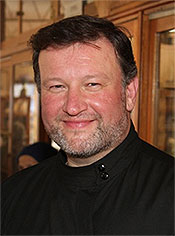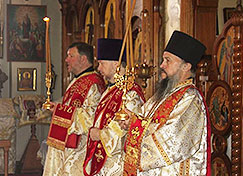Ecclesiastical Obedience as a Deacon
From the Editors of Unification: No divine service which requires ceremony can take place without a deacon, who adorns the service with his presence and his voice. One of our Australian deacons, Constantine Moshegov, has been fulfilling his obedience for several years in the Church of All Saints in Croydon, NSW, and in the Cathedral of SS Peter and Paul, and was recently elevated to the rank of protodeacon by His grace Bishop George. We asked Fr Constantine to tell us about how he came to the church and what qualifications, in his point of view, are the main requirements for a deacon.
 -Many future priests started to attend church as children, together with their parents. Was that the case with you? -Many future priests started to attend church as children, together with their parents. Was that the case with you?
-My parents were from Harbin, but I was born in Australia. As a child I did not go to church often, mostly on major holidays. I went to a Catholic school. In general, religion was part of my life since childhood, and I never doubt it very seriously. When I enrolled in college, my interest grew, I started reading about religion, and understood that Orthodox Christianity suited my soul, and I began to attend church regularly.
-Who influenced you during those years?
-It began in the Blacktown church under father Michael Konstantinov. He taught me to read Church Slavonic. Father Michael Boikov also had a great influence on me. Then I was tonsured a reader, and when I married, a subdeacon. In 2007, I was ordained a deacon, and this year a protodeacon. I would say now that father George Lapardin, the Senior Priest of the cathedral and my spiritual father, is my main influence. I serve in the cathedral, and the Croydon church. I am supported and helped by Father Simeon, the new rector of the Church of All Russian Saints, with whom I am friends. He was born in Australia, speaks two languages, so he communicates well with everyone. He is a seminary graduate and has great theological knowledge.
In the cathedral I serve together with Protodeacon Alexander Kotliaroff. He also helps me a great deal. I was not able to study in seminary, I am self-taught, you might say, that is why I am very grateful for their help.
-Your Russian is excellent, you speak without an accent, but you were born in Australia.
 -Well, I wouldn't say that it is excellent. We spoke Russian at home, I took private lessons for many years, and the Church, of course, helped. Our priests and deacons usually speak Russian. -Well, I wouldn't say that it is excellent. We spoke Russian at home, I took private lessons for many years, and the Church, of course, helped. Our priests and deacons usually speak Russian.
-What is most important for a deacon or a deacon to know, to fulfil their duties?
-Mainly, it is to believe and love God. The second necessary quality is love for the Church and understanding that Orthodoxy is a historic church, which confessed the ideals of Christ from the very beginning, and tries to hold on to its traditions. It is also necessary to know theology and the Bible. Of course you need to know our customs, how to serve and carry yourself in church. You need to know the cycle of services. It helps to have a good voice and musical sense. Though I am not great at it, I am trying to improve. The main thing I think is to love God and the Church. We have a lot of well-educated priests who have degrees, and we also have self-taught clergymen who love God and try to elevate their standards. They manage pretty well. I think the parishioners and priests sense who does this from the heart, and who is simply like an actor on stage. We have some of those too, unfortunately. Thank God, in Sydney we have zealous servants of God.
I know that most priests in our diocese and probably all the deacons also have a civil job in order to survive. I don't get paid for serving in church--everything a deacon earns I donate back to the church. I do this as my soul commands. I am a doctor: I received my medical degree from Sydney University, then worked as a general practitioner, even delivered babies, then decided to become a specialist. This took another 4 years of study, to become an ophthalmologist and eye surgeon. My wife and I lived in England for 2 years, then returned to Sydney. I opened a private practice, and also worked at Concord Hospital for 12 years.
When I became a deacon, I knew that this was too much for one person, so I stopped working in the hospital. I continue my private practice downtown. I work enough to support my family. I have two children�my daughter Sophia is 18, she wants to be a doctor and is studying medical science in college, and my son Julian is 15, he wants to study business.
-How did your wife react to your becoming a deacon?
-My wife was born in a Russian family; her mother was from Harbin to, and her father was from Tzian-zen. I became closer to the church under her influence. When we got married, I started attending all divine services, observed Lent strictly, also at her insistence. When I decided to become a deacon, my wife was not quite ready, but then of course she agreed. I think she sensed my desire, and understood that being the wife of a deacon is not as demanding as the life of a priest's wife. I am very grateful for her support.
-What has changed in your life after coming closer to the church?
-The Church forces you to think about God and the Kingdom of Heaven. In daily life it's so easy to sink into the material world, trying to earn more money, struggling to pay your bills, or buy a bigger house, a better car, take your family abroad for vacation. People spend a lot of time thinking about this. And they forget the most important thing, the salvation of their soul. But when you're close to the Church , it all reminds you of the most important thing. You remember that life on Earth is temporary.
As a deacon, I read the Bible more than before. Every Sunday before church, I prepare to read the Gospel. I don't understand everything right away, because of the language difficulties of Slavonic, therefore I then read the same passages in English. In studying Holy Scripture, you understand that there is something bigger than what we see around us. But if you don�t read and prepare for services, just stand in church, your thoughts easily meander back to our material world.
In Russia, our clergymen don�t make a bad living. There is pay, and some make a prestigious career out of it, especially those who have talent and higher education. But clergymen in Australia can�t think of it as a career; they view it as an obedience, because they love God. We are lucky in our diocese to have some remarkable priests and deacons�the words of God flow earnestly from their hearts.
unification.com.au
|